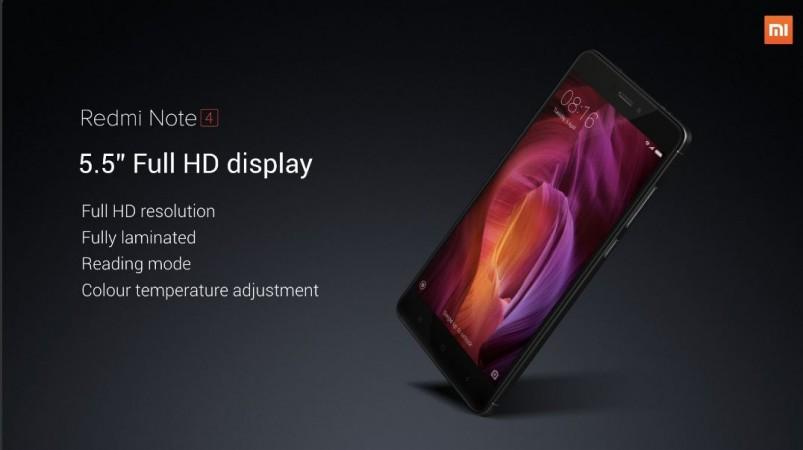
Earlier in the week, Xiaomi launched the much awaited Redmi Note 4 in India. It comes with several changes over its predecessor Redmi Note 3, in terms of design, core components and other aspects.
To provide better perspective on the new, we doing quick rundown on key feature difference between the two Redmi Note series generation.
Design:
The biggest differentiating attribute of the Redmi Note 4 over its predecessor is its design language. Having said that, the new Xiaomi phone looks like miniature version of the company's biggest mobile Mi Max. It's got a smooth metallic (high grade aluminium) body on the back , which tapers at the edge endowed with chamfered metal-based frame.
Down under, the speaker has been re-positioned for want of better sound dispersion.
In Redmi Note 3, the speaker is placed on the back side, which results in distortion of sound, when the device is kept with back facing the flat table.

Display:
Redmi Note 4's full HD (1290x1080p) resolution is same as the Redmi Note 3, but the new phone comes with additional later of 2.5D Gorilla glass, which not only protects the screen's edge from the accidental fall but also adds value in terms of looks.
CPU+RAM+Storage:
The Redmi Note 4 houses 64-bit class 2.0GHz Qualcomm Snapdragon 625 octa-core (8x ARM Cortex A53) CPU backed by Adreno 506 GPU, 32GB/64GB storage and up to 4GB RAM.
On the other hand, Redmi Note 3 is powered by 64-bit class Qualcomm Snapdragon 650 Hexa-core (ARM Cortex A72 dual-core + ARM Cortex A53 quad-core) with Adreno 510 graphics engine, 2GB/3GB RAM and 16GB/32GB storage
Though Redmi Note 4's Snapdragon 625 series processor seem sub-par compared to 650 series, it is much advanced CPU in terms of design, as the former is based 14nm (nano-meter) FinFET architecture-based, whereas the latter is a 28nm architecture.
This apparently helps Redmi Note 4 consume less power compared to Redmi Note 3.
Camera:
The Redmi Note 4 houses a 13MP camera with BSI CMOS sensor, f/2.0 aperture, PDAF (Phase Detection Auto Focus) and dual-tone LED flash.
On the other hand, Redmi Note 3 comes packed with 16MP shooter with PDAF (Phase Detection Autofocus) function, dual-tone LED flash, HDR, face/smile detection, dual-ISP (Image Signal Processor).
The Redmi Note 4's camera specifications indicate it is less superior in the megapixel counts compared to its predecessor, the former is actually better than the latter. It is actually a myth that higher the pixel count, the better the image quality, whereas it's the size of lens and type of sensor of the camera that helps in capturing quality pictures.
Both the models feature 5MP snapper on the front, but the new Redmi Note 4's camera is better as it boasts new beautify app with smart and pro mode.
Mobile OS:
Both the Redmi Note 3 and the Note 4 run Android v6.0.1 Marshmallow-based MIUI 8.0. The good news is that the company is ready with the new Android 7.0 Nougat-based MIUI and will be made available at the time of the first sale, which is scheduled on January 23.
The new Nougat software brings night mode, bundled notification, enhanced security update, improved battery optimisation, multi-window options, over 1500 Emojis, personalised settings and smarter notifications and more.
Also read: Android 7.0 Nougat released: 16 key upgrades of Google's new mobile OS update over Marshmallow
In addition to Nougat features, Xiaomi is expected to include new custom features such as themes, wallpapers and shortcuts to improve user-experience.
Also read: Redmi Note 3 Complete Review
Battery:
Xiaomi Redmi Note 4's battery (4,100mAh) is almost same as that of the Redmi Note 3 (4,050mAh). But, it will have 25 percent more battery life compared to its predecessor thanks to low-power consumption capability of 14nm (nano-meter) class FinFET architecture-based Snapdragon 625 octa-core processor.
Intial impression- is Xiaomi Redmi Note 4 worth the upgrade over Redmi Note 3?
Yes, We believe Xiaomi Redmi Note 4 will set a new benchmark in the mid-range phone category given the fact that the device boasts sumptuous 4GB RAM and 64GB internal storage for just Rs. 12,999. No other phone in the market offer this specification set and it is certain to stir up an another storm in the smartphone market just like the Redmi Note 3 did in 2016.
Also read: Xiaomi Redmi Note 4 review- True prodigy of Redmi Note 3
Key specifications of Redmi Note 4 and Redmi Note 3:
| Models | Redmi Note 4 | Redmi Note 3 |
| Display | 5.5-inch full HD display with 2.5D glass shield, fully laminated, reading mode, colour temperature adjustment capability
|
5.5-inch full HD (1920 x1080p) screen
|
| OS | Android 6.0.1 Marshmallow-based MIUI 8.0 (Android 7.0 Nougat preview available for devices sold in first flash sale) | Android 5.1 Lollipop based MIUI 7.0 (now upgraded to Android Marshmallow-based MIUI 8.0) |
| Processor | 14 nano-meter FinFET architecture-based 64-bit class 2.0GHz Qualcomm Snapdragon 625 octa-core (8x ARM Cortex A53) CPU | 64-bit class Qualcomm Snapdragon 650 Hexa-core (ARM Cortex A72 dual-core + ARM Cortex A53 quad-core) |
| GPU | Adreno 506 | Adreno 510 |
| RAM | 2GB/3GB/4GB: LPDDR3 | 2GB/3GB dual channel LPDDR3 |
| Storage | 32GB (eMMC v5.0 Flash)/64GB (eMMC v5.0 Flash); + 128GB via micro SD card | 16GB (with 2GB RAM)/32GB (with 3GB RAM) |
| Camera |
|
|
| Battery | 4100mAh (typ) / 4000mAh (min) lithium-ion polymer battery
|
4000 mAh
|
| Network | 4G-LTE (Cat. 6) with VoLTE (Voice-over-LTE) | 4G-LTE |
| Add-ons | Fingerprint sensor, dual-SIM (hybrid) slots, Bluetooth 4.2, Wi-Fi, Infrared (IR) sensor (Smart TV remote feature), USB v2.0 port, GLONASS/GPS, | Metal-body, finger-print sensor, dual-SIM slots (type: micro), Wi-Fi (802.11 b/g/n/ac), Bluetooth, GPRS, A-GPS, FM Radio, micro-USB, USB OTG |
| Dimensions | 151.0 x 76.0 x 8.45 mm | 150.0 × 76.0 × 8.7 mm |
| Weight | 165 g | 164 g |














